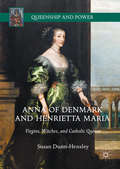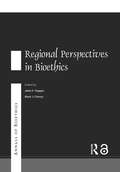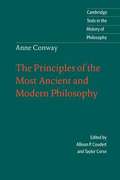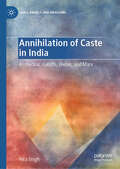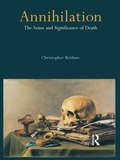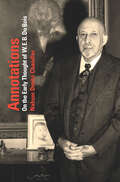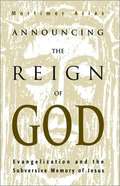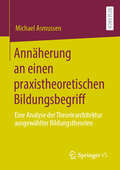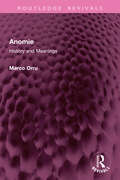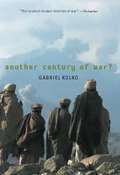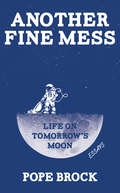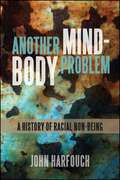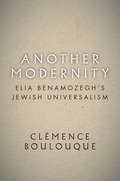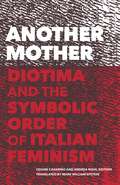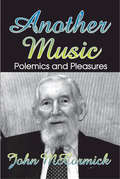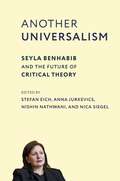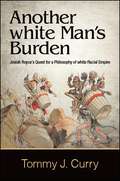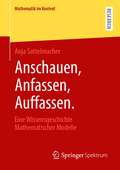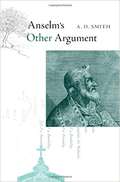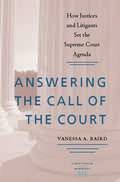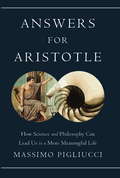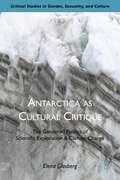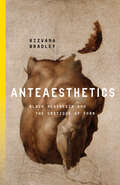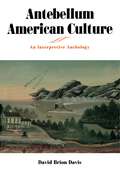- Table View
- List View
Anna of Denmark and Henrietta Maria: Virgins, Witches, and Catholic Queens (Queenship and Power)
by Susan Dunn-HensleyThis book examines how early Stuart queens navigated their roles as political players and artistic patrons in a culture deeply conflicted about the legitimacy of female authority. Anna of Denmark and Henrietta Maria both employed powerful female archetypes such as Amazons and the Virgin Mary in court performances. Susan Dunn-Hensley analyzes how darker images of usurping, contaminating women, epitomized by the witch, often merged with these celebratory depictions. By tracing these competing representations through the Jacobean and Caroline periods, Dunn-Hensley peels back layers of misogyny from historical scholarship and points to rich new lines of inquiry. Few have written about Anna's religious beliefs, and comparing her Catholicism with Henrietta Maria's illuminates the ways in which both women were politically subversive. This book offers an important corrective to centuries of negative representation, and contributes to a fuller understanding of the role of queenship in the English Civil War and the fall of the Stuart monarchy.
Annals of Bioethics: Regional Perspectives In Bioethics (Routledge Annals of Bioethics)
by Mark J. Cherry John F. PeppinRegional Perspectives in Bioethics" illustrates the ways in which the national and international political landscape encompasses persons from diverse and often fragmented moral communities with widely varying moral intuitions, premises, evaluations and commitments.
Anne Conway: The Principles of the Most Ancient and Modern Philosophy
by Karl Ameriks Desmond M. Clarke Anne Conway Allison P. Coudert Taylor CorseAnne Conway was an extraordinary figure in a remarkable age. Her mastery of the intricate doctrines of the Lurianic Kabbalah, her authorship of a treatise criticising the philosophy of Descartes, Hobbes, and Spinoza, and her scandalous conversion to the despised sect of Quakers indicate a strength of character and independence of mind wholly unexpected (and unwanted) in a woman at the time. Translated for the first time into modern English, her Principles of the Most Ancient and Modern Philosophy is the most interesting and original philosophical work written by a woman in the seventeenth century. Her radical and unorthodox ideas are important not only because they anticipated the more tolerant, ecumenical, and optimistic philosophy of the Enlightenment, but also because of their influence on Leibniz. This fully annotated edition includes an introduction which places Conway in her historical and philosophical contexts, together with a chronology of her life and a bibliography.
Annihilation of Caste in India: Ambedkar, Gandhi, Weber, and Marx (Marx, Engels, and Marxisms)
by Hira SinghThis book offers a critical re-examination of the relationship between caste and class. Singh demystifies caste based on a comparative analysis between a Weberian and Marxian understanding of power. He rejects Max Weber’s account of caste as rooted in culture which Weber saw as analytically distinct from the economic and political power. In contrast, Singh offers a Marxist analysis of caste as a matter of land (means of production) and labor (social relations of production). Extending his critique of the cultural understanding of caste, Singh examines one of the most prominent accounts of caste as a religious phenomenon specific to Hinduism. The book aims to show the intrinsic interconnectedness of class and caste.
Annihilation: The Sense and Significance of Death
by Christopher BelshawThe ever-present possibility of death forces upon us the question of life's meaning and for this reason death has been a central concern of philosophers throughout history. From Socrates to Heidegger, philosophers have grappled with the nature and significance of death. In "Annihilation", Christopher Belshaw explores two central questions at the heart of philosophy's engagement with death: what is death; and is it bad that we die? Belshaw begins by distinguishing between literal and metaphorical uses of the term and offers a unified and biological account of death, denying that death brings about non-existence. How our death relates to the death of the brain is explored in detail. Belshaw considers the common-sense view that death is often bad for us by examining the circumstances that might make it bad as well as the grounds for thinking that one death can be worse than another. In addition, Belshaw explores whether we can be harmed after we die and before we were born. The final chapters explore whether we should prevent more deaths and whether, via cryonics, brain transplants, data storage, we might cheat death. Throughout Belshaw shows how questions of personhood and life's value are bound up with our views on the sense and significance of death. "Annihilation's" in-depth analysis and insightful exposition will be welcomed not only by philosophers working on the metaphysics of death but also by students and scholars alike looking for a foundation for discussions of the ethics of abortion, euthanasia, life-support and suicide.
Annotations: On the Early Thought of W. E. B. Du Bois
by Nahum Dimitri ChandlerIn Annotations Nahum Dimitri Chandler offers a philosophical interpretation of W. E. B. Du Bois’s 1897 American Negro Academy address, “The Conservation of Races.” Chandler approaches Du Bois as a generative and original philosophical thinker-writer on the status and historical implication of matters of human difference, both the fact of and the very idea thereof. Chandler proposes both a close reading of Du Bois’s engagement of the concept of so-called race and a deep meditation on Du Bois’s conceptualization of historicity in general. He elaborates on the way Du Bois’s thought in this address can give an account of the organization of the historicity that yields the emergence of something like the African American, at once with its own internal dimensions and yet also as an originary articulation of forces and possibilities that have world historical implications. Chandler refigures Du Bois’s thought as a vital theoretical resource for rethinking our concepts of differences among humans and, so too, our understanding of modern historicity itself.
Announcing The Reign Of God: Evangelization And The Subversive Memory Of Jesus
by Mortimer AriasThis book offers a program for Christian evangelism based on the teachings of Jesus in Matthew, Mark, and Luke. This is a superb resource volume for those wishing to test the soundness of their understanding and practice of Christian evangelism. It is solidly grounded in the ministry of Jesus and illumined by testimonial statements and experiences drawn from a cosmopolitan variety of witnesses. . . <P><P>[Arias's] key contribution is the rehabilitation of the Kingdom of God as the controlling perspective for the proclamation of the gospel in word and deed. In a style helpful to scholar and nonscholar, he combs biblical sources, especially the Synoptic Gospels, in search of Jesus' own practice. The hermeneutical outlook is clearly dictated by Arias's own battle-tested experience in Bolivia, where he was bishop of the Methodist Church and where he underwent imprisonment as a consequence of his evangelistic practice. <P><P>After reading this book, dichotomies are inexcusable: - proclamation or social responsibility - intra-church or extra-church evangelization - the conversion of individuals or conversion of communities. [This book] should become at least a minor classic. --Jorge Lara-Braud, <P><P>Theology Today Chapter titles: The Good News of the Kingdom The Presence of the Kingdom The Imminence of the Kingdom The In-Breaking of the Kingdom The Eclipse of the Kingdom Announcing the Kingdom as Gift Announcing the Kingdom as Hope Announcing the Kingdom as Challenge End of the Eclipse? <P><P>Mortimer Arias was Methodist bishop in Boliva, Professor of Hispanic Studies and Evangelization at the School of Theology, Claremont, and a member of the World Council of Churches' Commission on world Mission and Evangelism. With his wife, Esther, he coauthored the popular book The Cry of My People.
Annäherung an einen praxistheoretischen Bildungsbegriff: Eine Analyse der Theoriearchitektur ausgewählter Bildungstheorien
by Michael AsmussenDieses Buch widmet sich dem Verhältnis von Praxis- und Bildungstheorien. In einer theoretisch-begrifflichen Auseinandersetzung mit Praxistheorien und Marotzkis Strukturaler Bildungstheorie geht es um die Entwicklung und Reflexion des theoretischen Vokabulars für einen praxistheoretischen Bildungsbegriff. Hierbei werden ebenso die aktuellen bildungstheoretischen Arbeiten von A.-M. Nohl, F. von Rosenberg und P. Bettinger einbezogen. Als Ergebnis entsteht eine Heuristik aus acht Bausteinen für einen praxistheoretischen Bildungsbegriff.
Anomie: History and Meanings (Routledge Revivals)
by Marco OrruFirst published in 1987, Anomie examines essential moments of Western thought, tracing the complex concept of anomie. The Greek origin of the term (a-nomia, absence of joy) relates it to the notions of disorder, inequity and anarchy. 20th century sociology has long called into question an over simple dichotomy between law and the absence of law. The book shows that this questioning is not new. It has its roots in Ancient Greek thought and in the founding texts of the Judeo-Christian tradition. It appears in the legal and religious states of the English Renaissance, and in the emerging sociology of 19th century French, where Orrù opposes the collectivism of Durkheim to the individualism of Jean-Marie Guyau. The latter’s thought, little recognized at that time, finds an echo in contemporary sociology, notably in American sociologist R. K. Merton. To write the history of the concept, to account for the fluctuations in meaning that it undergoes in the changing prism of diverse societies, to uncover the subterranean continuities between yesterday and today: this is the aim of the book. This book will be of interest to students of history, sociology, literature and philosophy.
Another Century of War?
by Gabriel KolkoAnother Century of War? is a candid and critical look at America's "new wars" by a brilliant and provocative analyst of its old ones. Gabriel Kolko's masterly studies of conflict have redefined our views of modern warfare and its effects; in this urgent and timely treatise, he turns his attention to our current crisis and the dark future it portends.Another Century of War? insists that the roots of terrorism lie in America's own cynical policies in the Middle East and Afghanistan, a half-century of real politik justified by crusades for oil and against communism. The latter threat has disappeared, but America has become even more ambitious in its imperialist adventures and, as the recent crisis proves, even less secure.America, Kolko contends, reacts to the complexity of world affairs with its advanced technology and superior firepower, not with realistic political response and negotiation. He offers a critical and well-informed assessment of whether such a policy offers any hope of attaining greater security for America. Raising the same hard-hitting questions that made his Century of War a "crucial" (Globe and Mail) assessment of our age of conflict, Kolko asks whether the wars of the future will end differently from those in our past.
Another Fine Mess: Life on Tomorrow's Moon: Essays
by Pope BrockThe author of Charlatan is &“the perfect armchair cosmonaut&” for &“a very funny and provocative rumination on the big move to off-planet real estate&” (Mark Haskell Smith, author of Blown). We&’ve gotten into another fine mess, destroying the planet and all. So where will we go next? Is it time to colonize outer space? Acclaimed essayist Pope Brock takes us on a vivid satirical journal to learn just what life might look like living on tomorrow&’s moon. &“Though the reader finds herself in happy contemplation of crisping ex-lovers with lasers from a future lunar workplace, or perhaps having imperfect sex in perfect spheres of water, or simply socializing on the moon with well-adapted sociopaths, nevertheless we also get to know the fiercely earthbound heart of Pope Brock. His vision is both funny and horrifying, a Seussian galaxy of rumpus absurdity and straight-talking hard truths. By the end of it one thinks, &‘Ah, Humanity&’ but right upon that one thinks, &‘Thank goodness for Pope Brock.&’&” —Leigh Allison Wilson, author of From the Bottom Up &“Deft, funny, profound in its implications—and also a grave prediction about the mess that may soon be transferred from the Earth to the moon. A beguiling and original story by a writer whose wisdom is only matched by his wicked comic timing.&” —Sarah Braunstein, author of The Sweet Relief of Missing Children &“An inspired observer with a poet&’s heart, his investigation into our lunar future is informed, wry and sublimely readable.&”—Cathy Galvin, founder of the Word Factory, London
Another Mind-Body Problem: A History of Racial Non-being (SUNY series, Philosophy and Race)
by John HarfouchThe mind-body problem in philosophy is typically understood as a discourse concerning the relation of mental states to physical states, and the experience of sensation. On this level it seems to transcend issues of race and racism, but Another Mind-Body Problem demonstrates that racial distinctions have been an integral part of the discourse since the Modern period in philosophy. Reading figures such as Descartes, Leibniz, and Kant in their historical contexts, John Harfouch uncovers discussions of mind and body that engaged closely with philosophical and scientific notions of race in metaphysics and the philosophy of mind, in particular in understanding how the mind unites with the body at birth and is then passed on through sexual reproduction. Kant argued that a person's exterior body and interior psyche are bound together, that non-White people lacked reason, and that this lack of reason was carried on through reproduction such that non-Whites were an example of a union of mind and body without full being. Charting the development of this phenomenon from sixteenth-century medical literature to modern-day race discourse, Harfouch argues for new understandings of Descartes's mind-body problem, Fanon's experience of being 'not-yet human,' and the place of racism in relation to one of philosophy's most enduring and canonical problems.
Another Modernity: Elia Benamozegh’s Jewish Universalism (Stanford Studies in Jewish History and Culture)
by Clémence BoulouqueAnother Modernity is a rich study of the life and thought of Elia Benamozegh, a nineteenth-century rabbi and philosopher whose work profoundly influenced Christian-Jewish dialogue in twentieth-century Europe. Benamozegh, a Livornese rabbi of Moroccan descent, was a prolific writer and transnational thinker who corresponded widely with religious and intellectual figures in France, the Maghreb, and the Middle East. This idiosyncratic figure, who argued for the universalism of Judaism and for interreligious engagement, came to influence a spectrum of religious thinkers so varied that it includes proponents of the ecumenical Second Vatican Council, American evangelists, and right-wing Zionists in Israel. What Benamozegh proposed was unprecedented: that the Jewish tradition presented a solution to the religious crisis of modernity. According to Benamozegh, the defining features of Judaism were universalism, a capacity to foster interreligious engagement, and the political power and mythical allure of its theosophical tradition, Kabbalah—all of which made the Jewish tradition uniquely equipped to assuage the post-Enlightenment tensions between religion and reason. In this book, Clémence Boulouque presents a wide-ranging and nuanced investigation of Benamozegh's published and unpublished work and his continuing legacy, considering his impact on Christian-Jewish dialogue as well as on far-right Christians and right-wing religious Zionists.
Another Mother: Diotima and the Symbolic Order of Italian Feminism (Cultural Critique Books)
by Andrea Righi Cesare CasarinoA groundbreaking volume introduces the unique feminist thought of the longstanding Italian group known as Diotima Introducing Anglophone readers to a potent strain of Italian feminism known to French, Spanish, and German audiences but as yet unavailable in English, Another Mother argues that the question of the mother is essential to comprehend the matrix of contemporary culture and society and to pursue feminist political projects. Focusing on Diotima, a community of women philosophers deeply involved in feminist politics since the 1960s, this volume provides a multifaceted panorama of its engagement with currents of thought including structuralism, psychoanalysis, linguistics, and Marxism. Starting from the simple insight that the mother is the one who gives us both life and language, these thinkers develop concepts of the mother and sexual difference in contemporary society that differ in crucial ways from both French and U.S. feminisms. Arguing that Diotima anticipates many of the themes in contemporary philosophical discourses of biopolitics—exemplified by thinkers such as Giorgio Agamben, Antonio Negri, and Roberto Esposito—Another Mother opens an important space for reflections on the past history of feminism and on feminism&’s future. Contributors: Anne Emmanuelle Berger, Paris 8 U–Vincennes Saint-Denis; Ida Dominijanni; Luisa Muraro; Diana Sartori, U of Verona; Chiara Zamboni, U of Verona.
Another Music: Polemics and Pleasures
by John McCormickAs the essays in this book attest, in a time of specialization John McCormick chose diversification, a choice determined by a life spent in many occupations and many countries. After his five years in the U. S. Navy in the Second World War, the academy beckoned by way of the G. I. Bill, graduate training, and a career in teaching. Prosperity in the American university at the time meant setting up as a "Wordsworth man," a "Keats man," or a "Dr. Johnson man": all chilling to the author. He chose self-exile in which he disguised himself as an "Americanist" saleable in Europe, and lectured happily in comparative studies: literature, history, and philosophy. Thus the broad range of this volume, both in subject matter and in the span of time it covers. The essays are divided into three sections. First are general and personal essays on a variety of topics, followed by work on individual writers, and third, writings on criticism and theory. A section on Santayana reflects his eight years of research for Santayana's biography. The writings on Spain and toreo (bullfighting) result from another long-held interest, together with the author's attempt to alter some of the romantic nonsense about the running of the bulls in Pamplona, too often the entire substance of what the general public knows about Spain. McCormick has long been convinced that without knowledge of bullfighting, the foreigner cannot comprehend arcane and wonderful aspects of the Spanish character. The coda, "Another Music," is an old man's attempt to solve the mysterious algebra of how the world turns now, and how the young appear to the aged. While the volume is diverse in its range of writers--from Whitman in America to Santayana in Europe, taken as a collectivity, these essays provide a sense of the grandeur as well as the decadent in twentieth century politics and aesthetics alike. Written with the literary taste and political non-conformity that still characterizes McCormick, the volume is a treat for the specialist (perhaps) and for the generalist (certainly).
Another Universalism: Seyla Benhabib and the Future of Critical Theory (New Directions in Critical Theory #84)
by Stefan Eich, Anna Jurkevics, Nishin Nathwani, and Nica SiegelSeyla Benhabib’s ongoing work has expanded the range and scope of critical theory beyond its origins to address questions of gender, migration, and difference. This book brings together an ensemble of leading theorists and younger voices to explore new dimensions of Benhabib’s thought across critical theory, feminism, and democratic theory, foregrounding the intricate relationship between critique and universality.Another Universalism provides both a wide-ranging and comprehensive engagement with Benhabib’s path-breaking interventions and a panoramic tour of the cutting edge of critical theory today. Contributors take part in key debates about the field’s past and future, tackling subjects such as the relationship between democracy and cosmopolitanism, the role of law in emancipatory struggles, human domination of nature, the deprovincialization of critical theory concerning questions of race and empire, as well as Hannah Arendt’s continuing significance. Covering a wide range of debates and themes, Another Universalism is united by a core question: How can universal norms of human freedom, equality, and dignity be reconciled with particular contexts, especially ones of exclusion, difference, and adversity? Searching for universalisms that emerge from the concrete struggles of emancipatory movements, this book points toward an expansive, inclusive, and radical democratic vision.
Another white Man's Burden: Josiah Royce's Quest for a Philosophy of white Racial Empire (SUNY series in American Philosophy and Cultural Thought)
by Tommy J. CurryWinner of the 2020 Josiah Royce Prize in American Idealist Thought presented by the Josiah Royce SocietyAnother white Man's Burden performs a case study of Josiah Royce's philosophy of racial difference. In an effort to lay bare the ethnological racial heritage of American philosophy, Tommy J. Curry challenges the common notion that the cultural racism of the twentieth century was more progressive and less racist than the biological determinism of the 1800s. Like many white thinkers of his time, Royce believed in the superiority of the white races. Unlike today however, whiteness did not represent only one racial designation but many. Contrary to the view of the British-born Germanophile philosopher Houston S. Chamberlain, for example, who insisted upon the superiority of the Teutonic races, Royce believed it was the Anglo-Saxon lineage that possessed the key to Western civilization. It was the birthright of white America, he believed, to join the imperial ventures of Britain—to take up the white man's burden. To this end he advocated the domestic colonization of Blacks in the American South, suggested that America's xenophobia was natural and necessary to protecting the culture of white America, and demanded the assimilation and elimination of cultural difference for the stability of America's communities. Another white Man's Burden reminds philosophers that racism has been part of the building blocks of American thought for centuries, and that this must be recognized and addressed in order for its proclamations of democracy, community, and social problems to have real meaning.
Anri Sala: "1395 Days without Red" and Other Videos
by Michael FriedAnri Sala is one of the most gifted and accomplished visual artists of his generation. Michael Fried first encountered Sala's video, film and installation art in 2005 and has been following his work since. This collection of essays focuses on what Fried identifies as a few major and recurring themes in Sala's work, such as the treatment of absorption and the overarching issues of anti-theatricality and presentness. Throughout the book, which is illustrated with numerous colour stills from Anri Sala's videos, Fried pursues a highly personal approach of combining extremely fine-grained structural and thematic readings of individual works with philosophical and theoretical reflections often drawing on major thinkers in the Western philosophical tradition, including Ludwig Wittgenstein and the eighteenth-century philosopher Friedrich Schiller.Fried also provides unique insight into his own renowned critical and theoretical work, which has exercised such great influence in art history and criticism for nearly sixty years. Employing in these moments a conversational tone, speaking directly to the reader in his own voice about his own work, he reviews the genesis and development of his theories and critical constructs in light of Anri Sala's videos, creating a highly productive back and forth between Sala and the contemporary art world on the one hand and Fried's often more historical studies and concepts on the other. For readers of Michael Fried, the result is not only a stimulating discussion of Sala and the artistic and theoretical tradition in whose light his work can be viewed, but also a vital reflection on Fried's own foundational ideas, how they came to be and how they are relevant today.
Anschauen, Anfassen, Auffassen.: Eine Wissensgeschichte Mathematischer Modelle (Mathematik im Kontext)
by Anja SattelmacherDas Herstellen, Sammeln und Verbreiten mathematischer Modelle war im 19. und frühen 20. Jahrhundert weit verbreitete Praxis an Universitäten und technischen Hochschulen.Anhand ausgewählter Modelle im Kontext ihrer Sammlungen lässt sich zeigen, dass das Wissen über mathematische Modelle im Prozess der Modellierung, des Sammelns, des Veräußerns und des Ausstellens generiert wurde. Dabei flossen sowohl künstlerische Praktiken als auch reformpädagogische Überlegungen in dieses Wissen mit ein. Im Zentrum der Studie stehen Mathematikprofessoren, die die Verwendung von Modellen im Kontext der akademischen Lehre auf unterschiedliche Weise vorantrieben. Weniger bekannt ist hingegen, dass auch Frauen einen wichtigen Anteil an der Produktion von Modellen hatten. Das Buch leistet mit den Auswertungen zahlreicher Quellen aus unterschiedlichen Archiven sowie einer ethnographischen Beobachtung eines Modellbauers einen wichtigen Beitrag für eine praxeologisch orientierte Wissenschaftsgeschichte.
Anselm's Other Argument
by A. D. SmithAnselm of Canterbury (1033-1109 CE), in his work Proslogion, originated the "ontological argument" for God's existence, famously arguing that "something than which nothing greater can be conceived," which he identifies with God, must actually exist, for otherwise something greater could indeed be conceived. Some commentators have claimed that although Anselm may not have been conscious of the fact, the Proslogion as well as his Reply to Gaunilo contains passages that constitute a second independent proof: a "modal ontological argument" that concerns the supposed logical necessity of God's existence. Other commentators disagree, countering that the alleged second argument does not stand on its own but presupposes the conclusion of the first. Anselm's Other Argument stakes an original claim in this debate, and takes it further. There is a second a priori argument in Anselm (specifically in the Reply), A. D. Smith contends, but it is not the modal argument past scholars have identified. This second argument surfaces in a number of forms, though always turning on certain deep, interrelated metaphysical issues. It is this form of argument that in fact underlies several of the passages which have been misconstrued as statements of the modal argument. In a book that combines historical research with rigorous philosophical analysis, Smith discusses this argument in detail, finally defending a modification of it that is implicit in Anselm. This "other argument" bears a striking resemblance to one that Duns Scotus would later employ.
Answering the Call of the Court: How Justices and Litigants Set the Supreme Court Agenda (Constitutionalism and Democracy)
by Vanessa A. BairdThe U.S. Supreme Court is the quintessential example of a court that expanded its agenda into policy areas that were once reserved for legislatures. Yet scholars know very little about what causes attention to various policy areas to ebb and flow on the Supreme Court's agenda. Vanessa A. Baird's Answering the Call of the Court: How Justices and Litigants Set the Supreme Court Agenda represents the first scholarly attempt to connect justices' priorities, litigants' strategies, and aggregate policy outputs of the U.S. Supreme Court. Most previous studies on the Supreme Court's agenda examine case selection, but Baird demonstrates that the agenda-setting process begins long before justices choose which cases they will hear. When justices signal their interest in a particular policy area, litigants respond by sponsoring well-crafted cases in those policy areas. Approximately four to five years later, the Supreme Court's agenda in those areas expands, with cases that are comparatively more politically important and divisive than other cases the Court hears. From issues of discrimination and free expression to welfare policy, from immigration to economic regulation, strategic supporters of litigation pay attention to the goals of Supreme Court justices and bring cases they can use to achieve those goals. Since policy making in courts is iterative, multiple well-crafted cases are needed for courts to make comprehensive policy. Baird argues that judicial policy-making power depends on the actions of policy entrepreneurs or other litigants who systematically respond to the priorities and preferences of Supreme Court justices.
Answers for Aristotle: How Science and Philosophy Can Lead Us to A More Meaningful Life
by Massimo PigliucciHow should we live? According to philosopher and biologist Massimo Pigliucci, the greatest guidance to this essential question lies in combining the wisdom of 24 centuries of philosophy with the latest research from 21st century science. In Answers for Aristotle, Pigliucci argues that the combination of science and philosophy first pioneered by Aristotle offers us the best possible tool for understanding the world and ourselves. As Aristotle knew, each mode of thought has the power to clarify the other: science provides facts, and philosophy helps us reflect on the values with which to assess them. But over the centuries, the two have become uncoupled, leaving us with questions—about morality, love, friendship, justice, and politics—that neither field could fully answer on its own. Pigliucci argues that only by rejoining each other can modern science and philosophy reach their full potential, while we harness them to help us reach ours. Pigliucci discusses such essential issues as how to tell right from wrong, the nature of love and friendship, and whether we can really ever know ourselves—all in service of helping us find our path to the best possible life. Combining the two most powerful intellectual traditions in history, Answers for Aristotle is a remarkable guide to discovering what really matters and why.
Antarctica as Cultural Critique
by Elena GlasbergArguing that Antarctica is the most mediated place on earth and thus an ideal location for testing the limits of bio-political management of population and place, this book remaps national and postcolonial methods and offers a new look on a 'forgotten' continent now the focus of ecological concern.
Anteaesthetics: Black Aesthesis and the Critique of Form (Inventions: Black Philosophy, Politics, Aesthetics)
by Rizvana BradleyIn Anteaesthetics, Rizvana Bradley begins from the proposition that blackness cannot be represented in modernity's aesthetic regime, but is nevertheless foundational to every representation. Troubling the idea that the aesthetic is sheltered from the antiblack terror that lies just beyond its sanctuary, Bradley insists that blackness cannot make a home within the aesthetic, yet is held as its threshold and aporia. The book problematizes the phenomenological and ontological conceits that underwrite the visual, sensual, and abstract logics of modernity. Moving across multiple histories and geographies, artistic mediums and forms, from nineteenth-century painting and early cinema, to the contemporary text-based works, video installations, and digital art of Glenn Ligon, Mickalene Thomas, and Sondra Perry, Bradley inaugurates a new method for interpretation—an ante-formalism which demonstrates how black art engages in the recursive deconstruction of the aesthetic forms that remain foundational to modernity. Foregrounding the negativity of black art, Bradley shows how each of these artists disclose the racialized contours of the body, form, and medium, even interrogating the form that is the world itself. Drawing from black critical theory, Continental philosophy, film and media studies, art history, and black feminist thought, Bradley explores artistic practices that inhabit the negative underside of form. Ultimately, Anteaesthetics asks us to think philosophically with black art, and with the philosophical invention black art necessarily undertakes.
Antebellum American Culture: An Interpretive Anthology
by David Brion DavisFirst published in 1979, this volume offers students and teachers a unique view of American history prior to the Civil War. Distinguished historian David Brion Davis has chosen a diverse array of primary sources that show the actual concerns, hopes, fears, and understandings of ordinary antebellum Americans. He places these sources within a clear interpretive narrative that brings the documents to life and highlights themes that social and cultural historians have brought to our attention in recent years. Beginning with the family and the issue of socialization and influence, the units move on to struggles over access to wealth and power; the plight of "outsiders" in an "open" society; and ideals of progress, perfection, and mission. The reader of this volume hears a great diversity of voices but also grasps the unities that survived even the Civil War.
